>>
Industry>>
Healthcare>>
How Stem Cell Therapy Supports...How Stem Cell Therapy Supports Autism Cognitive Development?
The Silicon Review
19 June, 2024
Abnormal cognitive development can make it difficult for children with autism to socialize, communicate and learn, drastically impacting their quality of life. Fortunately, there is an autism treatment that can support cognitive functioning and restore quality of life.
In this article, we'll dive into stem cell therapy, exploring the different types of stem cells and how they can treat autism. We’ll also touch on safety, post treatment care, efficacy and treatment cost.
What are Stem Cells?
Stem cells are cells with self-renewal properties that can differentiate into many different types of cells, including muscle cells, bone cells or brain cells.
Types of Stem Cells Used in Therapy
Embryonic stem cells are stem cells obtained through the destruction of a human embryo, which poses serious ethical concerns. Embryonic stem cell therapy also comes with risk such as immune rejection and tumor growth.
Adult mesenchymal stem cells (MSCs) are a popular type of cell used in stem cell treatment for autism. MSCs can differentiate into a variety of cells, including brain cells, blood cells and muscle cells, allowing them to treat a range of conditions. MSCs can be ethically obtained from a donor or the recipient’s own cells.
Mechanisms of Stem Cell Therapy in Autism
To treat autism, MSCs differentiate into neurons and repair and regenerate damaged brain tissue, leading to long-term cognitive improvement. MSCs also have immunomodulatory properties, allowing them to treat immune system dysregulation and inflammation common in autism.
Clinical Applications and Benefits
Children with autism suffer from an impairment in cognitive functions, sociability and speech, which stem cells can improve through neurogenesis.
Autism has also been linked to gastrointestinal issues and the immune system.
Stem cell therapy for autism can treat the neuroinflammation, gastrointestinal inflammation and immune responses that can cause autism symptoms.
Autistic children treated with stem cell therapy often see benefits, including:
- improved sociability
- improve speech
- improved cognition
- reduced behavioral issues
Photo by Paige Cody on Unsplash
Specific Therapeutic Approaches
Use of Donor vs. Own Cells
Donor cells may be a better choice when the recipient’s own cells aren’t healthy enough due to age or health. Donor cells often come from the placenta or umbilical cord of a newborn, which means these cells are younger, healthier and more capable of repairing damaged cells.
A recipient’s own stem cells must be sent to a lab before treatment, which increases. On the other hand, donor cells can be used immediately.
Extracting stem cells from the patient can also be an invasive process and the quantity of stem cells can be limited. However, using a recipient's own cells comes with a lower risk of immune rejection.
Role of Exosomes in Enhancing Therapy
MSC-derived exosomes can cross the blood-brain barrier and stimulate neural differentiation and growth, which is beneficial in treating neurological diseases like autism.
Additional Treatments: Macrophages and T-reg Lymphocytes
T-reg lymphocytes play an important role in modulating the immune system, and their imbalance can lead to the progression of diseases like autism. Treatment with T-reg lymphocytes can support immune function and improve autism symptoms.
Macrophages produce different cytokines and play a key role in preventing inflammatory diseases, like autism, from progressing.
Safety and Efficacy
Mitigation of Risks: Infection, Immune Rejection, Tumor Growth
To mitigate the risks of this therapy, choose a clinic that provides pretreatment evaluation to identify risks and post-treatment care to monitor for unexpected events, such as infections. Choose stem cell therapy that uses MSCs since MSCs don’t put you at risk of tumor formation or immune rejection.
Rigorous Testing for Purity, Viability, and Sterility
Choose a treatment center that prioritizes quality and safety. Clinics like Swiss Medica culture stem cells in a controlled environment and use viability assessments, trypan blue exclusion and flow cytometry to determine viability.
![]()
Ethical and Non-invasive Harvesting Methods
MSCs can be ethically extracted from the placenta or umbilical cord of a newborn. MSCs can also be harvested from the fat tissue, bone marrow or gum tissue of the recipient in a minimally invasive way.
Cost and Accessibility
Stem cell therapy is still a relatively new treatment and can be expensive, making it inaccessible to some. However, traveling to a country with a lower cost of living can help you find quality treatment at an affordable price.
In Conclusion
Stem cell therapy for autism is a promising treatment, but stem cell therapy comes with the stigma of ethical and safety issues. However, these concerns are associated with embryonic stem cells. MSCs are ethically sourced and safe to use.
Children with autism who are treated with MSCs can see significant improvement in social skills, cognition and speech. To mitigate any side effects, choose a clinic that offers comprehensive pretreatment evaluation and prioritizes safety and quality through rigorous testing.









